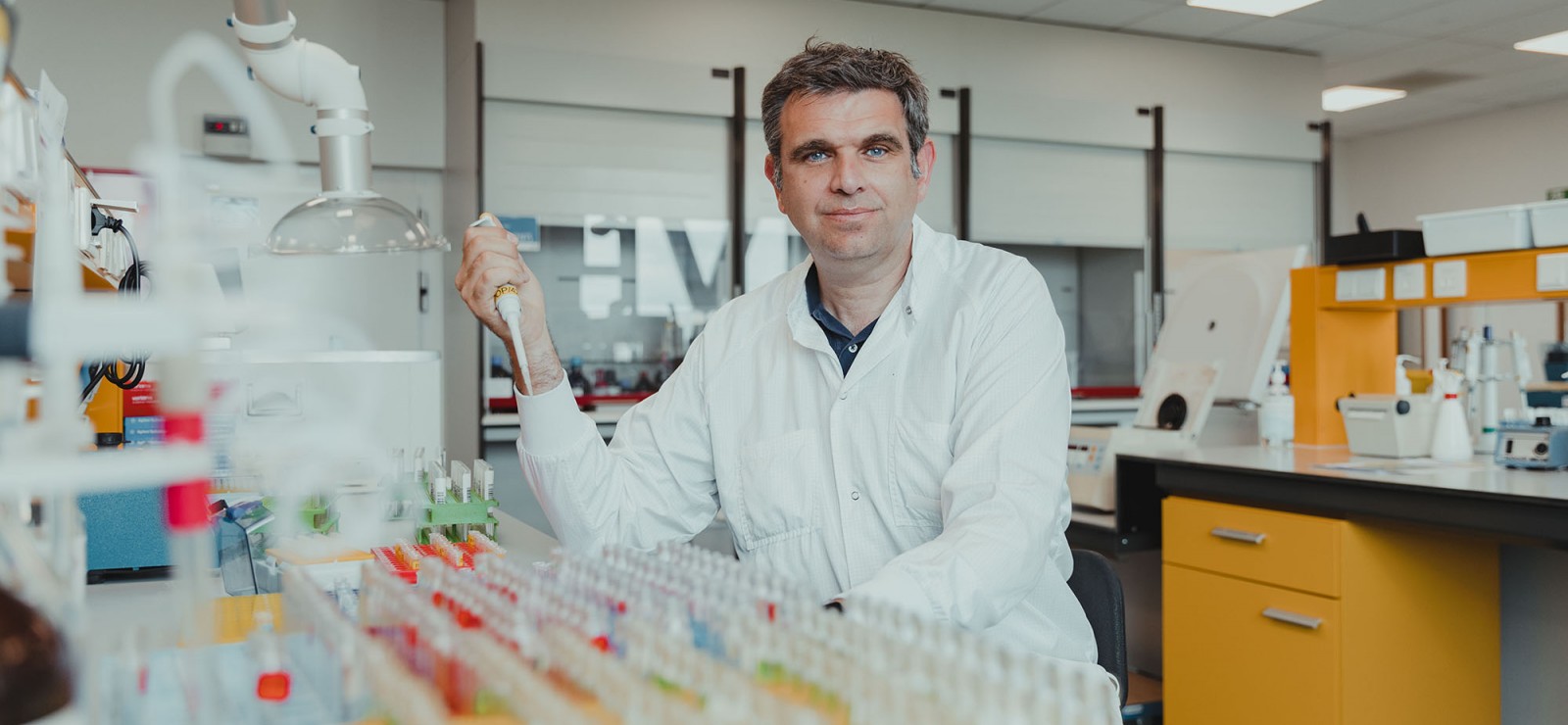The Doping Control Lab at Ghent University is an international authority in the field of doping research. The lab will be sending a delegation to the Olympics in Tokyo this year, just like it did during previous editions. But why is this necessary? Why aren’t athletes free to choose what they do with their own body? DoCoLab’s manager, prof. Peter Van Eenoo, sheds some light on these questions.
The brand-new building which adjoins the Faculty for Pharmaceutical Sciences at Ghent University and has been housing the DoCoLab for the last couple of months, catches the eye with its playful shapes. Inside, prof. Van Eenoo seems hardly to notice as he moves up the staircase to his lab at a brisk pace. It’s a busy time for him and his colleagues. “We’re one of 33 laboratories worldwide accredited by the World Anti-Doping Agency (WADA), so we’re regarded as being on the cutting edge in this field of research. But corona virus almost did us in. Our lab is self-supporting, we generate all our revenue through sample analysis. We don’t get any other type of support. But no sports means no samples, which means no income,” Van Eenoo says as he walks into the lab and grabs his white coat off the rack.
Luckily, the lockdown has finished and sports competitions are back in full swing, which means DoCoLab is operating at full capacity. The lab is all hustle and bustle; researchers move through intricate rows of terminals and machines. The room is filled with the tinkling sound of fragile test-tube glass holding anonymous samples. Van Eenoo sits down and looks around as if he’s surveying the troops. “Right now, we’re rebuilding our buffer, which means the pressure is on. I’m staying home this year to coordinate the lab during the Olympics, but I’ll definitely be helping our delegation prepare as well. There’s just so much to do.”
Then let’s get right into it: why isn’t doping allowed?
"There are two main reasons. The first one is athlete health. Doping checks are necessary because, otherwise, athletes would start using progressively larger amounts of medicine or drugs for performance-enhancing effects. This substance use would pose an ever-increasing risk since the athlete would effectively be gambling with their health on the short and the long term."
"The second reason has to do with fair play and cheating. The rules clearly state that doping is not allowed, in the same way that certain types of tackles aren’t allowed in football or placing a motor in your bicycle during cycling competitions. Doping monitoring helps us ensure fair play as much as possible."
There are many who would cast doubt on the health argument. Is substance use not a personal choice?
"I think it’s important that we keep in mind that the use of substances always carries with it an inherent risk. Naturally, there are gradations. Not every substance poses the same amount of risk to a user. However, I do want to emphasize that all medicine and drugs pose some amount of intrinsic risk to the user. But you could indeed posit that substance use is a personal choice; that everyone should be free to put into their body whatever he or she wants. An athlete who decides to use performance-enhancing substances, only puts himself at risk, and this is his own responsibility. He doesn’t endanger others."
"This argument, however, doesn’t take into account the enormous pressure that doping legalization would put on athletes. It would force people who are opposed to the use of substances to make an impossible choice: either you dope, or you lose. You would pressure people into taking health risks they wouldn’t want to take in the first place. This means that an individual who dopes actually does have an effect on others."

Are there no doping methods that pose an acceptable level of risk?
"There are no sports that justify the risks connected to doping, no matter the scale or the method. Of course, there are examples of acceptable levels of risk in many types of substance use outside of sports. Covid vaccines are a good example. These also pose a certain risk. Think of those unfortunate few who experienced the worst kind of side-effect and died of thrombosis."
"This, however, does not negate the acceptability of the risk levels for the vaccines that are currently in use since their function is to save lives. Hypothetically, say the risk level for a certain vaccine is one complication for every million administrations. In this case, the thousands of people who would have become ill or even died without the vaccine absolutely justify mass vaccination. This is an example of acceptable risk. Not administering the vaccines means people would die."
"Conversely, this is not the case for doping. When you dope, you give a substance to a healthy person. That person takes a risk which is not necessitated by the situation he is in and which can lead to all kinds of unforeseen health complications. Such substance use could never be justified."
There will always be athletes who dope. Wouldn’t it be safer to allow doping and monitor use in stead of forbidding it outright?
"Right now, we have a zero-tolerance policy. The rules are very clear. But one could imagine a different set of rules. For example, you used to hear quite a lot that small amounts of EPO have a positive effect on athlete health because it raises haemoglobine levels, the protein in your red blood cells responsible for transporting oxygen through your body, after a large exertion. On the face of it, this reasoning sounds acceptable."
"But what do you do when an athlete starts to take a little bit more EPO than his colleagues? Wouldn’t the other athletes not come under pressure to progressively increase their own intake? Where would you draw the line and how would you determine what is acceptable and what isn’t?"
"Hypothetically, if everything were allowed, this would pose unjustifiable health risks to athletes and, besides this, there would be no more level playing playing field. But, for argument’s sake, let’s say we allowed limited use. This would mean an exponential increase in the demand for and complexity of monitoring. This is unrealistic: as the situation stands today, there aren’t enough resources going to anti-doping monitoring already. This means that a zero-tolerance policy is the only defensible policy, since it doesn’t increase health risks and, contrary to alternatives, is realistically enforceable."
"I’ll offer you a thought experiment to clarify: imagine there are 50 students in a bar and they have been told that they are not allowed to drink beer. You are given the assignment to make sure that they don’t. It isn’t easy to monitor 50 people at once, but it isn’t impossible either. Let’s now imagine that you could choose to do an alternative assignment instead: those same 50 students are allowed 2 beers each, but no one is allowed to get drunk. It falls to you to ensure that they don’t. In both scenarios, you only get paid if you succeed 100%. "
"I don’t think there’s any doubt about which of the two assignments most people would choose."
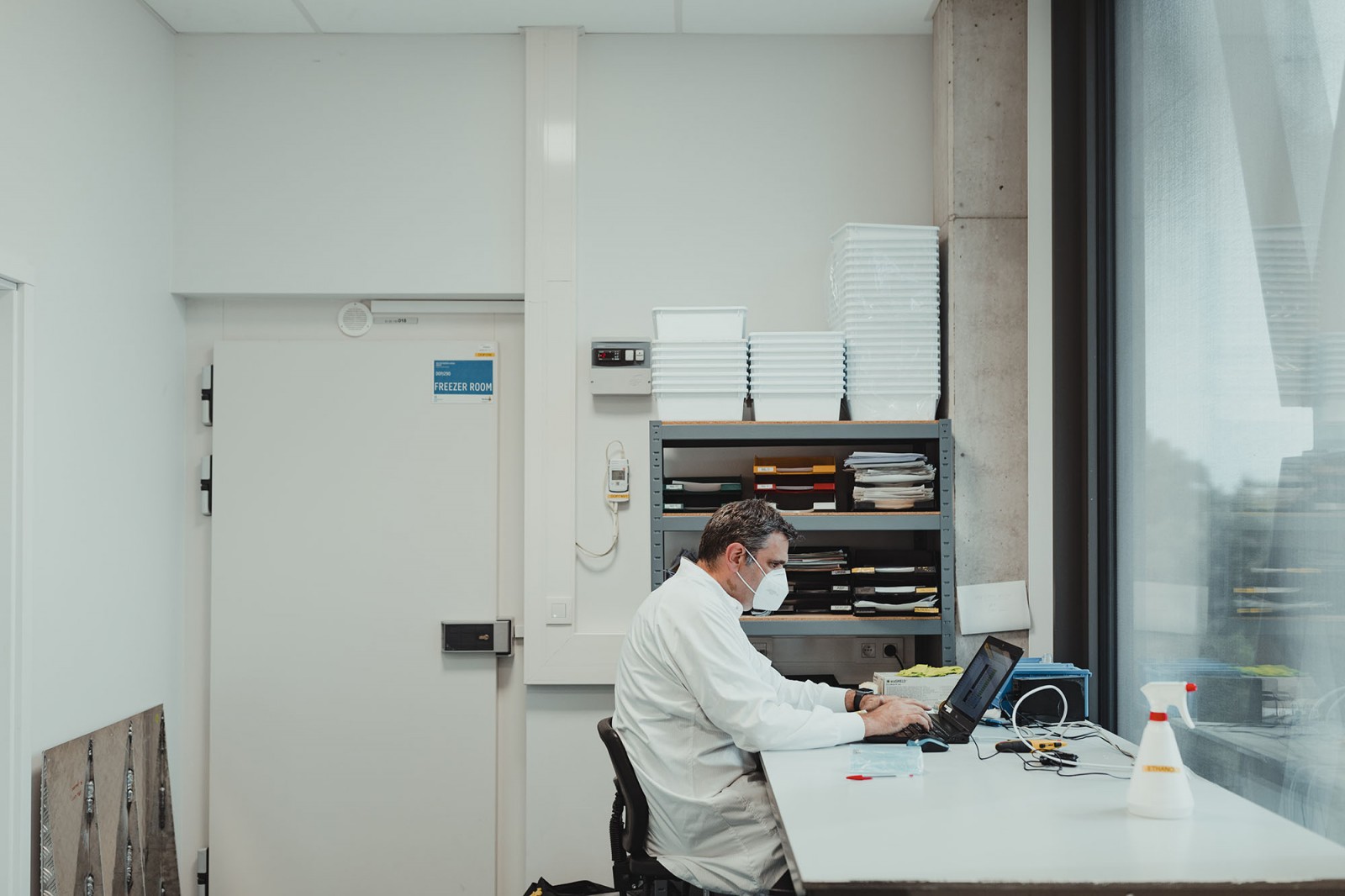
The American gymnast Simone Biles was heavily criticised in 2016 when it was revealed that she took ADHD medication, which also enhanced muscular function and endurance. Are there grey zones in the use of substances in sport?
"In principle, this isn’t a grey zone. If there is a therapeutic necessity for medication and the athlete has permission from the sports federation she reports to, as was the case with Biles, there’s really not much to argue about."
"It goes without saying that there will always be doctors who are prepared to do malicious things, such as making false diagnoses. But that isn’t a grey zone. That’s just people taking advantage, abusing a rule which is well-intentioned."
Are athletes who test positive only given punitive measure or are remedial steps taken as well?
"In principle, only punitive measures are taken. These measures range from a warning all the way up to a permanent exclusion from competitions. Under certain circumstances, athletes are shown leniency. Depending on, among other things, which substance they used, what their motivations were, if they cooperate with the enquiry and if the athlete shows remorse."
"They wouldn’t, for example, suspend a seventeen-year-old if cannabis is found in their blood and if the young athlete states that he genuinely didn’t know that it wasn’t allowed. But if they find EPO in the blood of a professional endurance athlete, you can rest assured that the measures will be more severe than merely scratching competition results off the books."
Shouldn’t punitive measures also be remedial?
"I don’t think so. If one violates the anti-doping code, in almost all cases they will be well aware of what they’re doing. An athlete is given a punitive measure, such as suspension, primarily because he has caused damage to others. I am a great proponent of a system that makes people think of their behaviour, but also gives people second chances. Because suspension isn’t the same as exclusion. As soon as the punishment is over, the athlete can get right back at it. So long as there’s no subsequent transgressions, everything is fine. If they continue to break the rules, however, then I find it only reasonable that an athlete is permanently excluded."
Have you noticed an evolution in public opinion regarding doping?
"Things like that are always in flux. I find it difficult to discern a clear evolution in public opinion. It also depends on what country and period we’re talking about, and whether there have been any recent doping scandals. Those always have an enormous impact on the public discourse and on the level of both repressiveness and permissiveness shown in the application of anti-doping policy. You can really argue that public opinion moves in both directions at once."
"In Belgium today, for example, cannabis is an illicit substance for athletes; if they test positive for cannabis use, there would definitely be consequences. But I’m absolutely sure that, were I to take a national survey, more than 80% of the population would be for scratching that substance off the list. Because cannabis being a performance-enhancing substance is very contentious claim. In just a few decades, people have become much more permissive in this area."
"On the other hand, I always find it striking to see how shocked my Phys Ed students are during my classes on doping when I show them the tobacco commercials Eddy Merckx did in the seventies. Today, such a thing would be unimaginable. They would never accept a guy like, say, Eden Hazard figuring in cigarette ads. In this area, there has been a clear evolution in the direction of repression."
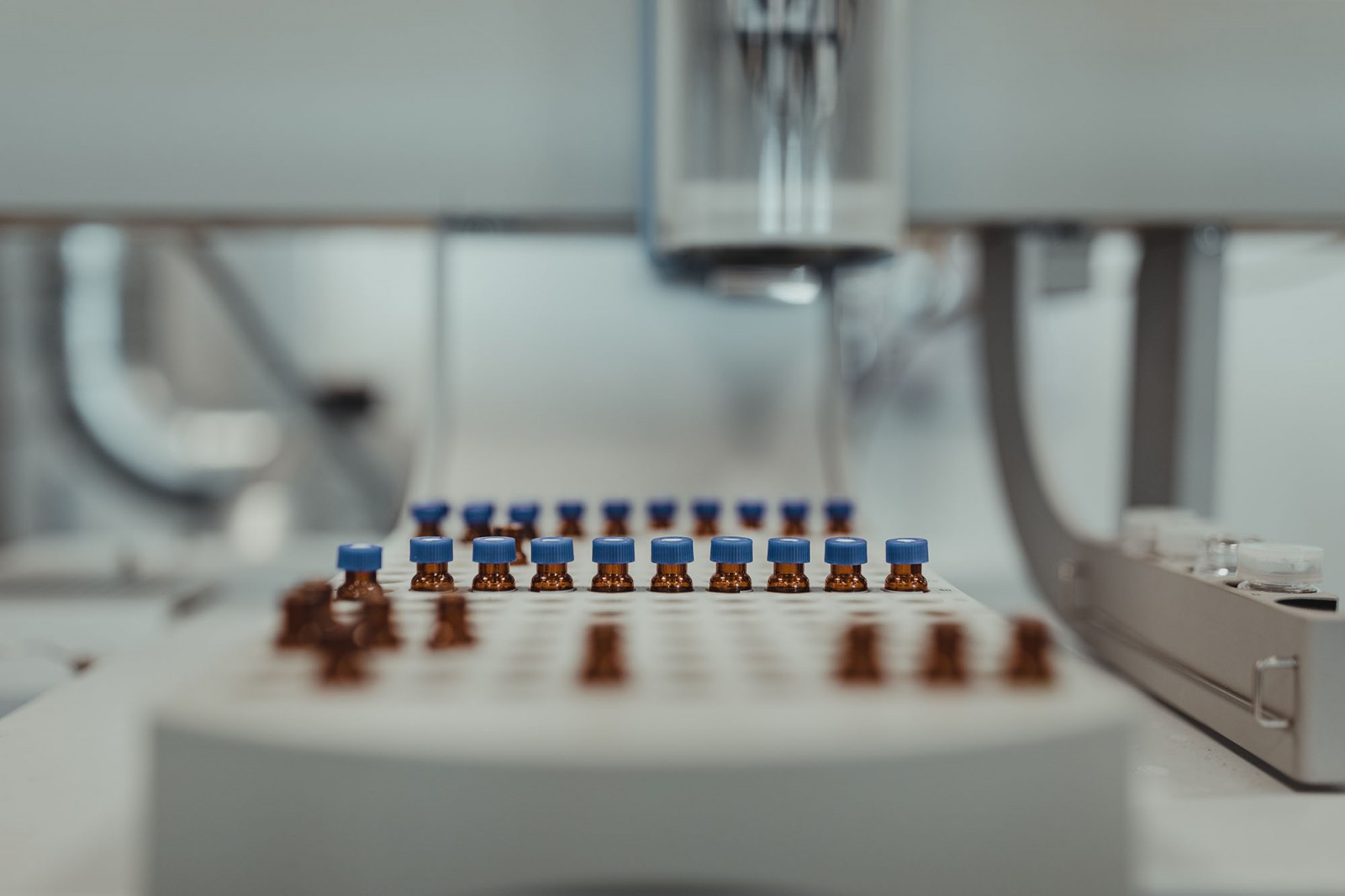
Is there a geographical difference in how people think about doping?
"If we’re talking about anti-doping legislation, it’s important to keep in mind that this legislation applies globally since most sports are practiced world-wide. This means the rules are the same everywhere. This also implies that the legislation must be acceptable to everyone. They have to be a kind of lowest common denominator on issues such as the two examples regarding cannabis and tobacco, because opinions on these matters can differ strongly from country to county. Belgians no doubt view lighting a joint much differently than for example Saudi Arabians. These strong differences help to explain why the zero-tolerance policy is so strongly embedded internationally."
"However, if we’re talking about the way the populace thinks about doping, there really aren’t any differences: if a foreign athlete gets caught, then the system works. If a countryman tests positive, there must have been a procedural error (laughs). This holds true here, in Russia and in the US."
I always find it striking how often people point to the laboratories involved in doping testing when, yet again, they cast doubt on test results after an athlete is given harsh sanctions. I want to emphasize that mistakes like these are extremely rare since the process used in accredited labs is really rigorous and the consequences connected to making such mistakes are truly disastrous for all involved.
"What’s also interesting, is the differing attitude people have in the current climate towards corona tests compared to doping tests. The Belgian hurdling athlete Eline Berings experienced this recently. She was denied access to the EC for athletics due to a positive corona test. Later, it became clear that the test was a false positive, but the relevant authorities didn’t rescind their decision! And to add insult to injury, there were no financial compensations or even an statement of apology. Such a thing would be unthinkable in the case of a false positive doping test."
Do athletes weigh in enough on the public discourse regarding doping?
"Sadly, no, most don’t. No matter how you spin it, when you get down to it, doping monitoring is in essence a negative story. Most big names in sports completely agree with the necessity to monitor doping but, at the same time, don’t publicly state that they do, which is unfortunate. I think people are afraid to associate themselves with something that has negative connotations, as though they could get burned and suffer damage to their public image."
"The lack of resources in doping monitoring is, in fact, a direct result of this. Policy makers don’t like putting doping on the agenda because it’s not a sexy subject. It’s similar to cancer research in that respect. Here’s a field of research in which extraordinary things are being done, but that, at the same time, also suffers from a structural lack of resources. Why is this? It’s because people don’t like talking about cancer. They don’t like being associated with it. It’s something everybody instinctually recognizes, this inherent awkwardness whenever anyone broaches the subject."
"Besides this, athletes also don’t like talking about doping monitoring in a positive way because many of them experience it negatively. This is understandable. It bothers people to have to prove their innocence without actually having done anything wrong. It also doesn’t help that monitors have to ensure there is no foul play in the production of samples and that the only way to do this, is by direct observation. In a way, this is a breach of privacy. I wouldn’t enjoy it either if a doctor, who I wouldn’t even be able to choose myself, would have to join me in the bathroom, just so that I would be allowed to go to work."
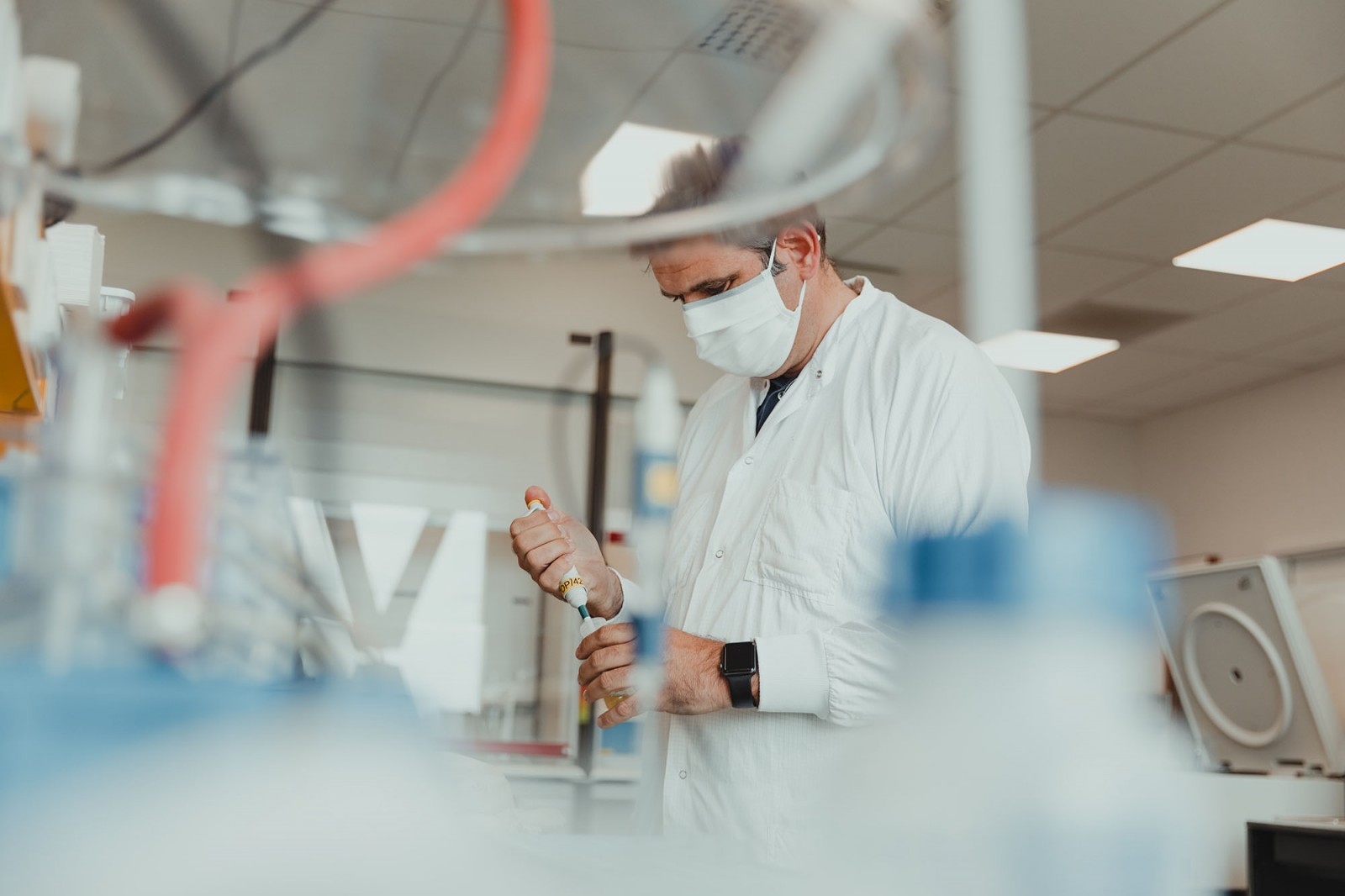
Don’t progressively more difficult to detect forms of doping, such as gene doping, in which athlete’s DNA itself is altered to improve performance, discourage you?
"On the contrary, doping monitoring is like the story of the poacher and the gamekeeper. The poacher will always find new and more sophisticated poaching methods and the gamekeeper will always be hot on his tail. Of course, the gamekeeper will usually be one step behind – but not always! That’s what’s important."
"New methods have been developed to detect gene doping and these will be in use at the Olympic Games in Tokyo. As of yet, there are no indications that gene doping is being used widely. However, I don’t doubt that, sooner or later, gene doping will become a more common phenomenon due to gene therapy being used in a large range of applications outside of sports. "
"Coincidentally, right now we’re working on a project to develop an alternative testing method for gene doping which will pre-empt future circumvention, together with the University of Groningen and the Centre for Medical Genetics at the Ghent University Hospital."
Is this a DoCoLab specialty?
"Our research focus is on the development of methods to detect low concentrations of substances in samples. In 2012, for example, we developed a better method to detect low concentrations of stanozolol, a steroid that has been in use since the 80s. Using our methodology, re-analysis of samples from the Olympics in Peking in 2008 and London in 2012 came up with 113 new positive tests."
"Among other things, this retroactively caused the Belgian relay team with Kim Gevaert and Elodie Ouedraogo to get the gold instead of the silver due to one of the athletes in the Russian team testing positive. The gamekeeper is always one step behind, but in the end, he always catches the poacher."
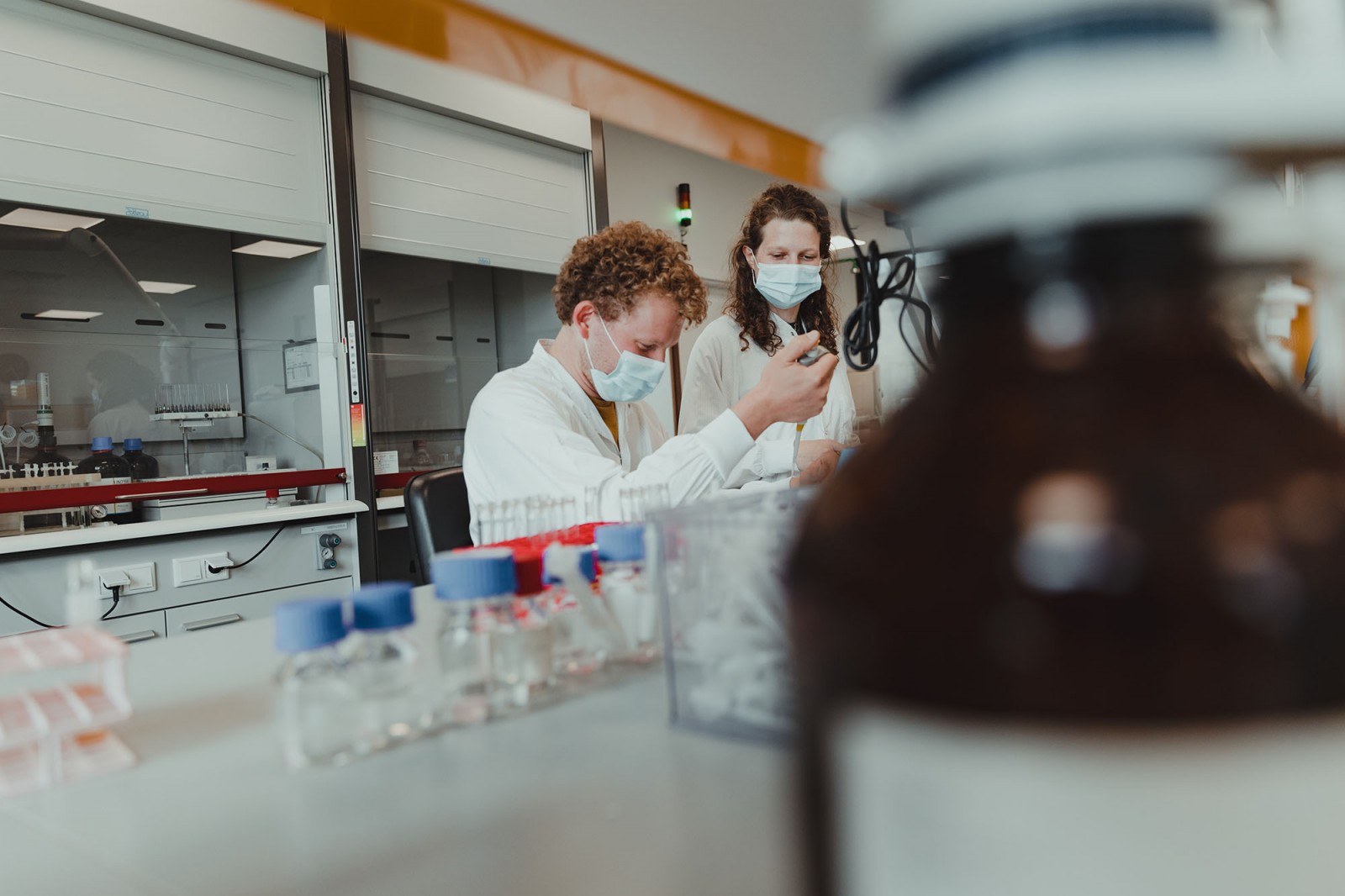
What role is the DoCoLab going to play at the Olympics in Tokyo?
"Primarily sample analysis. Pre-Olympic testing, the testing of athletes before they are sent to the Games, is gradually finding wider use internationally. This has caused a large increase in samples to analyse at our lab. The second role we play is done by the delegation we are sending to the Olympic lab. Our colleagues Kris Roels and Wim Van Gansbeke are going to the Olympic Games and Fiona Hooghe and Koen Deventer are going to the Paralympics. They will man the machines and check results in Tokyo."
"The corona measures in Tokyo will undoubtedly make this year’s Games a very strict affair. My colleagues’ travel options have been severely restricted by the local government, which is obviously understandable. They will be allowed to go from their hotel to the lab and back again. I doubt they will see much of the city. It’s unfortunate for them, but it does mean I’m slightly less jealous to have to stay at home this year."
8 Ghent University students experience Olympic dream in Tokyo
Combining high-level sport with studying: it is not easy. But some Ghent University students do it successfully. This year, no less than 8 students from Ghent University are going to the Olympic Games in Tokyo.
Read also
Ghent University professor collaborated remarkable opening ceremony of Olympic Games: "The pressure was on"
No traditional opening for the Olympic Games in Paris, but a spectacular fleet of 95 boats on the Seine with 10,500 athletes on board. It was a historic moment and a technical feat. The research group of Evert Lataire, Ghent University professor of Ships and Marine Technology, trained the captains for this unique boat parade.
Alumnus Inge Bru coaches Paralympic athletes in Paris: "It's going to be intense!"
Good news for sports fanatics, the summer of sports is not over yet! Our Belgian athletes will soon be competing at the Paralympic Games. Alumna Inge Bru, specialist in physical medicine and rehabilitation at Ghent University Hospital, accompanies them in Paris.
Ghent University researchers support Olympic track cyclists: optimal performance thanks to sensors and AI
If the Belgian track cyclists win a medal at the upcoming Olympic Games, it will not only be the result of top performances but also of top research. In the Flemish Cycling Centre Eddy Merckx, a stone's throw from the Watersportbaan, a group of researchers from the IDLab of UGent-imec supports our track cyclists with the help of artificial intelligence (AI).
Ghent-based DoCoLab helps to control doping at the Olympic Games
The doping controls at the upcoming Olympic and Paralympic Games will again have a Ghent connection. The doping control lab of Ghent University, DoCoLab for short, is sending a team of researchers to Paris to help check many thousands of samples. Peter Van Eenoo, head of the lab, professor and cycling fan, will be part of that team: "We won't have lots of free time, but I do hope to catch some of the cycling (laughs)."
